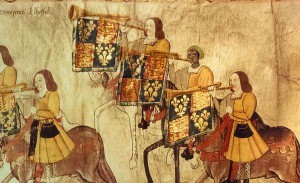On Identity
The following is a speech by Alain de Benoist at the NPI conference at The Ronald Reagan Building, Washington DC, October 26, 2013, translated from the French by Tom Sunic
Ladies and Gentlemen,
Before I start off with my speech, I would like to apologize for having an obligation to inflict some pain on you! Listening to a speech in the English language with a French accent, as awful as mine, may indeed turn out to be a kind of torture for you. But rest assured: I’m much better in French!
As you can guess, the subject of my speech is the notion of identity.
In a famous passage from his Confessions, Saint Augustine writes: “What is time? If nobody asks me about this, well, then I know its meaning, but if somebody asks me about it and if I try to explain it, I do not know it any longer.”
Saint Augustine’s remarks about time could also be used regarding identity: identity poses no problems as long as nobody asks questions about it. Identity is then taken for granted; it comes as something natural. Yet a totally different situation arises the minute we ask ourselves: “Who am I?” or “Who are we?” Or better yet: “What does that mean to be an American? “, “Qui est Français”?, or ” Was ist deutsch? “
It is not at all easy to talk about identity, because contrary to what many people believe (starting with those who want to defend identity), identity is not a simple concept. It is rather a very complex issue.
Identity is a complex subject because it emerges as a problem precisely at a moment when it is no longer taken as something given. In this sense identity is a typically modern subject. In traditional societies no one ever questions his identity the reason being that it is taken for granted by all, as something self-evident. Hence our first remark: it is at a moment when identity — be it individual or collective identity — is under threat, or has already disappeared, that one begins asking questions as to what identity is all about. This is the case today and this is the reason why identity has become such a burning issue, both on the political and the ideological level. Identity has become a problematic issue in the modern and the postmodern age in view of the fact that its reference points are fading away and in view if the fact that no one really knows any longer what makes the meaning of life. Read more





